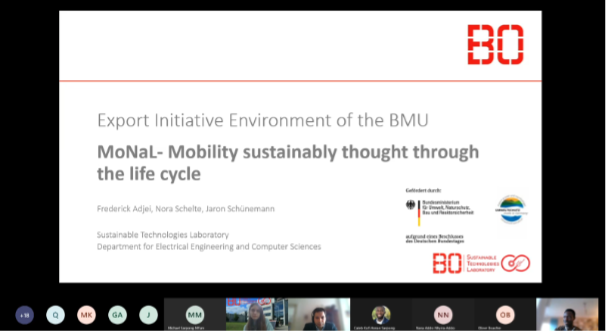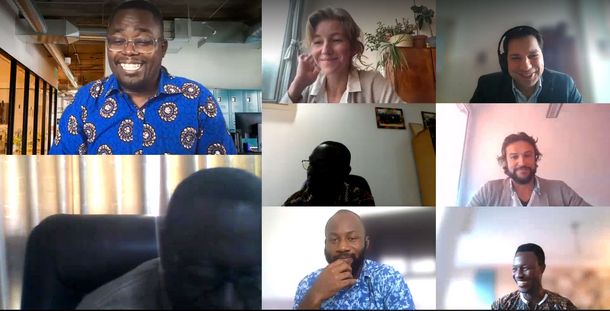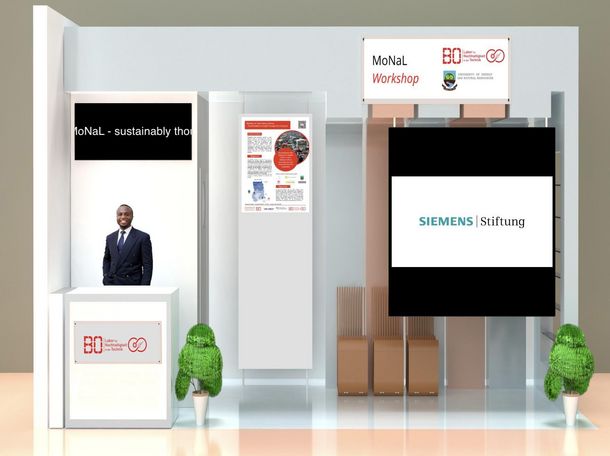WACEE 2021 Conference
International expert talks at WACEE conference on e-micromobility and decentralized energy systems in Ghana
Growing prosperity and population in Ghana are increasing the demand for mobility. At the same time, the impact of climate change and the need for decarbonization through environmentally friendly mobility alternatives is becoming increasingly important. Due to this challenge, the Sustainable Technologies Laboratory is researching and piloting sustainable mobility concepts for sub-Saharan Africa in the MoNaL project. The target country of the project and the measures, funded by the German Federal Ministry for the Environment, Nature Conservation and Nuclear Safety (BMU), is Ghana.
At this year's West African Clean Energy and Environment Trade Conference & Fair (WACEE) on 29.09. and 30.09.2021, discussions were held on the topics of e-mobility and decentralized energy systems as part of the project "Mobility sustainably through the life cycle" (MoNaL). The conference was organized by the German Chamber of Commerce Abroad (AHK) and took place virtually. The technical contribution to the MoNaL project focused on the challenges and opportunities of micromobility options and decentralized energy systems. Synergies to circular economy approaches were highlighted. Industry representatives, business leaders, decision makers and high-level experts came together to exchange ideas on these topics.
With the help of a virtual booth, the Sustainable Technologies Laboratory presented the MoNaL project and organized a stakeholder workshop in cooperation with the Siemens Foundation. The topic was electromobility and decentralized energy systems in Ghana. The head of the Sustainable Technologies Laboratory at Bochum University of Applied Sciences, Prof. Dr.-Ing. Semih Severengiz, opened the workshop for all participants. Afterwards, research assistants Nora Schelte, Frederick Adjei and Jaron Schünemann gave an introduction to the project work. The project encompasses the environmental impact of the mobility offer with e-vehicles such as e-scooters or e-cargo bikes holistically by analyzing the entire life cycle of products. This includes aspects of product design, production as well as energy supply and recycling. Marah Köberle (Siemens Stiftung) and Bernard Adjei (Impact Hub Accra) then spoke about the potential of e-mobility for social, economic and ecological development in Ghana. In the future, a climate-friendly mobility solution will be implemented that supports a sustainable and local value chain for production. This includes the operation and maintenance of the e-mobility products, as well as the implementation of solar charging stations in collaboration with local authorities.
There was another contribution from Lisa Wendzich (SunCrafter GmbH) on the topic of circular off-grid solar energy for micromobility. During this presentation, it was emphasized that off-grid energy solutions are particularly fast to install, low in emissions and reliable in power generation. The last presentation within the workshop was about "Integration of Solar Microgrids in Closed Systems and Interfaces with Electromobility" and was given by Michele Velenderić (Green Power Brains). The main goals of his work are to promote the holistic approach to electromobility, strengthen stand-alone energy demand response through smart microgrids, as well as develop curriculum activities, student exchanges, and internships at the university and professional levels.

The presentations were followed by a panel discussion moderated by Vincent Nhyira -Addo (Joy Multimedia Group Ghana). The discussion served as a platform to talk about challenges and necessary policy decisions that arise with the deployment of electric mobility in Ghana. During the discussion, Dr. Godwin Ayetor (KNUST), Dr. Emmanuel Amankwah (UENR) as well as Prof. Dr.-Ing. Semih Severengiz (HSBO) pointed out the importance of active exchange between educational institutions in order to advance the expansion of e-mobility. Students are currently as well as in the future important for the emergence of innovations in this field. Michele Velenderić (GreenPowerBrains) and Kelechi Ofoegbu (Impact Hub Accra) also pointed out that special schools should be built around the topic as well as programs for training existing talents. In addition to the topic of education, the increased demand for energy due to e-mobility and the unstable energy grid in Ghana were also discussed. Decentralized energy systems such as mini-grids can help solve this problem and take the current pressure off the national power supply. For this, it needs the support of authorities and the government. Oliver Boachie, Special Advisor to the Minister within the Ministry of Environment, Science, Technology and Innovation (MESTI), stated within the discussion that the government will do everything possible to support e-mobility, as the importance of this issue has been recognized by all sides. The key, he said, is to coordinate stakeholders, development actors and ministries to create the necessary legal and policy framework for e-mobility. He further stated that MESTI would coordinate this in due course.

As the MoNaL project progresses, coordination with government stakeholders to implement environmental standards in the area of reuse/recycling for mini-grids will be initiated. Furthermore, the scientific evaluation of the environmental benefits and social and economic impacts of e-vehicles in combination with mini-grids for energy supply is pending.
FUNDED BY

Funding program:
Export Initiative Environmental Technologies
Project Number:
FKZ 16EXI4011A
Funding Ministry:
Federal Ministry for the Environment, Nature Conservation and Nuclear Safety (BMU)
Project Sponsor:
VDI/VDE-IT Berlin


